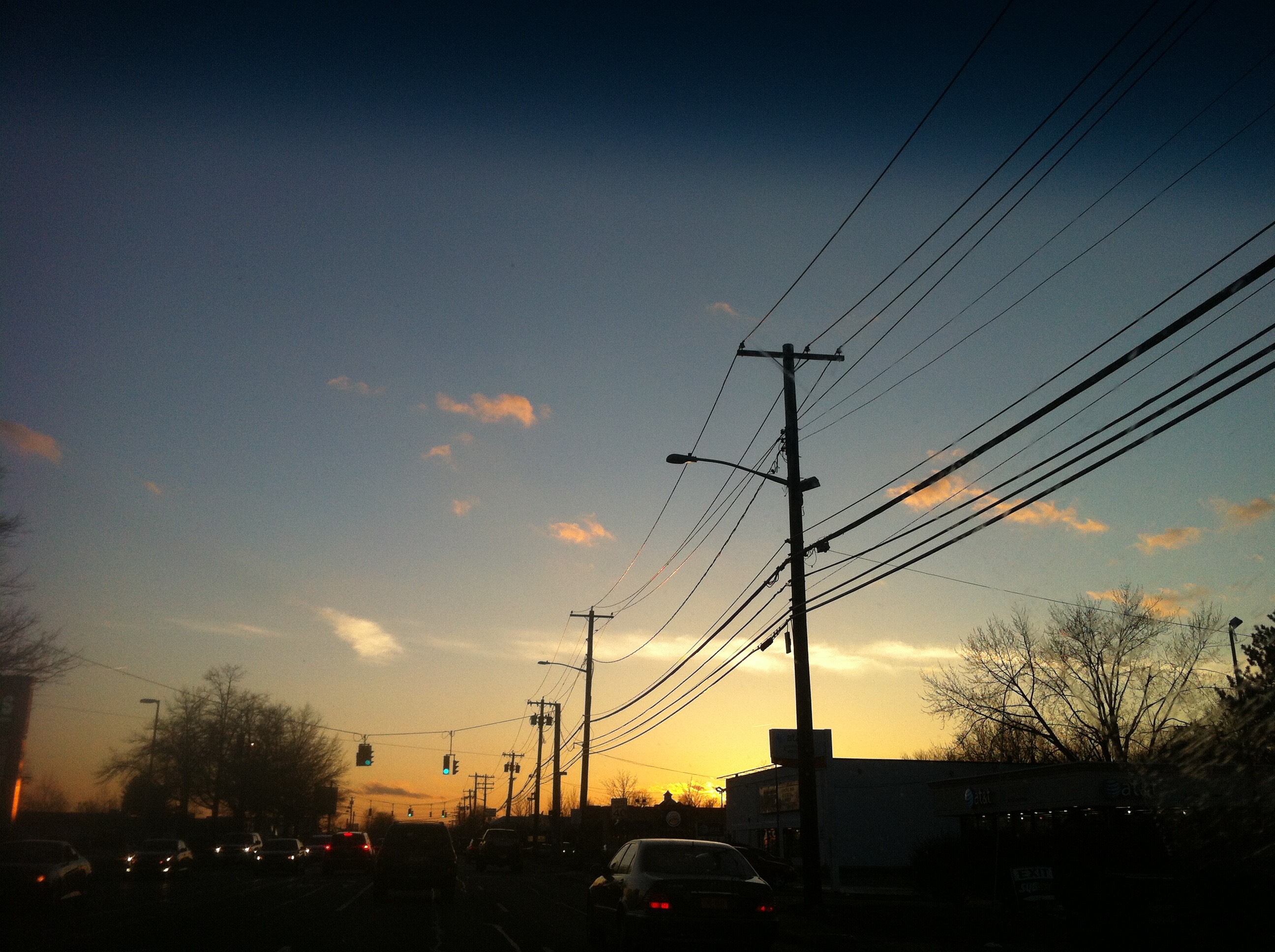Long Island is shaped like a rudimentary sketch of a fish. It is a small enough fish that one might assume it to be harmless. It looks fragile around the edges, wisped out like it has been in a sad little scuffle. But Long Island has teeth sharpened by seashells and designer bracelet fads. Dix Hills sits in the stomach of this fish, and it appears that this fish has swallowed a post World War II paradise whole. Even in its prototypal iteration, it must have already been considered perfect with its two-car garages, swimming pools, and sprawling green lawns.
My hometown is made of rolling hills and dipped down streets, nooks and crannies and cul-de-sacs and long, wide commercial roads that connect everything. Everyone speeds here. My favorite street in town throws your car up and down so quickly, I referred to it as “the rollercoaster road” as a kid. When you drive on Vanderbilt Parkway, all the colors blend together. The street and the sky meld into one big blur: dark blues and grays and browns and brick in the winter, hot flashes of orange and green splattered yellow in the fall. The road is surrounded by trees with skinny branches, so that when the light finds a way through, it does so in beams that twist and turn about your periphery. The parkway is mostly a straight track, but you can feel every rise and fall in the roll of the drive. William Kissam Vanderbilt II had it built in the early 1900s, so he could race without running the risk of killing anyone, which inevitably happened anyway. When you plunge down the parkway, with the windows open to let in cool air, you feel invincible. When you close your eyes in the car on Vanderbilt Parkway, it feels like flying.
Although almost 30,000 people live in Dix Hills, most of the time, it feels like only a few thousand people, milling around and bumping into each other, refusing to move their shopping carts out of the way. People will suddenly turn the corner of an aisle and ram into you with their cart, and then act surprised to see you there, moving through the spaces that they also move through. With the same fierce hot air that lawyers or professional athletes blow, Dix Hills residents have a certain amount of braggadocio, an effect that makes them very punchable.
The practice of how to live as a Dix Hills resident starts young. In fourth grade, a classmate swiped the case for my new glasses off my desk. “Costco?” she scoffed, as my acned cheeks burned. I did not know yet that it mattered, nor did I know that some kids were taught there was a right place to get something so stylistically insignificant to me at the time. By the time I got to high school, the divide became more obvious to me, in fixtures like sweet sixteens and vacation photos. Lacking these accessories did not bar me from too much, but those who had them lacked any fear that any of it could go away. They spoke of the future effortlessly, certain of its shiny, casual existence, where they would always be able to afford clothes, cars, and college.
A main street like Deer Park Avenue, or D.P.A as it is locally abbreviated, softly carries the scent of rubber and metal and fast food on the wind—it’s difficult to believe it was mostly farmland a century ago. As a kid, my family and I would get dollar cones at the McDonald’s drive-thru at random. Even in the winter, we could not resist this vanilla ritual. The air has trace notes of soil from the plant nurseries, where I got my communion corsage and picked up prom boutonnieres. It’s where I got my first pedicure in fourth grade, a shade of purple my mother described as “not my age.” My school bus would barrel down D.P.A through the cool blue of morning traffic, driven by an older lady with dreamcatchers hanging from the mirror. You can get anything you want on D.P.A, or get to anywhere you want from D.P.A. Because of that, everyone is always in a hurry to get there.
To experience Dix Hills at its core, you must be in a car. I began to enjoy errands early on, to appreciate the peace that comes from going somewhere on a small mission, and then completing it. Trips to buy groceries or buy sneakers for school or post mail at the post office were small, pleasurable adventures. When I started to sit in the passenger seat next to my mother, I learned how to see the world up close. I learned that if you wait long enough, you can always get the parking spot you want. I learned that most people lack patience. The car exposed me to a local radio station where callers could answer a question to win a prize. My family got so good at it, we started to win almost every month. Maybe we were the only ones really calling, but it felt so good to hear the phone ring, to wait and wait and wait and then finally win, even if our only reward would be a Friendly’s gift card.
I fell in love in cars, and I fell in love with the places we’d end up: basements, parks, pizza joints, desolate and crowded pieces of suburbia. I fell in love in front of other people’s fire pits, in the low lighting of the movie theater. I fell in love in and with the high school parking lot, the way it would flood and drain with cars in the morning and the afternoon. Dix Hills taught me that love tastes like a bacon-egg-and-cheese sandwich, and feels like tired eyes that just won’t close. Love looks like Dix Hills in the spring, when everything suddenly melts and time begins to move again, even if it is toward the same old thing. Love is familiar, even when it’s stupid. Dix Hills is stupidly lovable. You just have to learn how to forgive it.
Talking about where I’m from, I’ve learned, can be an awkward game of chance. If the person asking has no notion of the island, they usually shrug or nod the conversation forward. When I say “Dix Hills” to those who have heard of it, they often will flash me some kind of delicious smirk, like I have been caught red handed. A cursory Google search for “Dix Hills, New York” brings up an image of 14 Hart Place, which runs to almost 1.5 million dollars. Much of the town is made up of farm ranches and colonials, glossy McMansions set in stone. They are brash, ostentatious, evidence of winning the American social lottery.
Unlike those magazine-ready houses that always looked so cold, my house was always warm with the scent of fried plantains and muted yellow lighting from 1970s chandeliers, barely hanging on by their old chains. The rooms are huddled together. Everything there flows across the living room, voices mashing into laughter through the walls, painted in beige and paneled with wood. Creole poured into the phone lines. The difference between my house—old, worn, comfortable—and those other houses wore me down in my youth, as is the custom of places like this. I wanted the security those houses offered.
 Melinda Fakuade
Melinda FakuadeI grew up in Dix Hills by way of parental strategy— my mom was born in Haiti and my dad was born in Nigeria. They bought reasonably priced property towards the edge of the school district line, so I’d have a good place to go. The public school district is the crown jewel of Dix Hills. We were prepared for standardized testing to the point of absurdity. It was cool to overachieve, to excel at everything, and my teachers cared. The district library is where I fell in love with reading. I would pick out around twenty books and go through them in a week. I learned what sex was through context clues in novels above my grade reading level. The library fostered the exact thrill in me that 2000s education wanted. It felt like an adventure. My public school system made me love learning,and made me realize how stupid it is that not everyone is allowed to have that.
My circumstances were good—I had good grades, good friends, good opportunities. But still, at every pool party in the summertime, I could not help but feel envy stir in my heart. The difference between these kids and I was marginal, but yet felt mountain sized. I was black. I was not wealthy. Around fifth grade or so, I began to wince at the thought of inviting friends over. “How could I bring them to this place?” I once wondered out loud to my father, in a moment of juvenile honesty. I wanted parents who worked glitzy jobs in the city, who were never home but could always take off when they needed to. I wanted a pool too, complete with a slide and a diving board.
Years later, when the image of my father’s expression came to me in a flashback, I realized how much that must have hurt him, even if he didn’t let it show. Instead of a pool, I had a mostly empty backyard. We had woods that reached back farther than I’d ever go, even today. But the forest gifted us the occasional visit from foxes, bunnies, deer, and chipmunks. We had an apple tree and a fig bush when we moved here, but we cut them down. In the summertime, my sister and I would spend hours riding our bikes, catching butterflies during the day and fireflies at night. We would occasionally keep a caterpillar overnight, naive to the fact that we were nearly killing them. Nature in Dix Hills is everywhere, but you have to go look for it. I was lucky to have it so close, even if I’d rather have had a trampoline. I know it is spring on Long Island when I come home to the bush in front of the house blooming with gorgeous pink flowers. They fleet from us only after a few weeks, like an old friend passing through town.
There is nothing about suburban Long Island to love, until you decide to leave it. It’s hard to find sentimental value in Jeep Wranglers, or seagulls fighting for french fries on your first glance. When I come home, I go to diners and delis first. There is not much else to do after that, besides sit on someone’s couch and talk about where I’ve been and where I’m going. My hometown is a place for men to sculpt Nike socked calves out of their sons one way or another, a place for women to debate among themselves in a Facebook group if the holiday season warrants tipping their housekeepers extra, if at all. It was never supposed to be a place for me, or families like mine, and yet, I belong to it.
Melinda Fakuade






